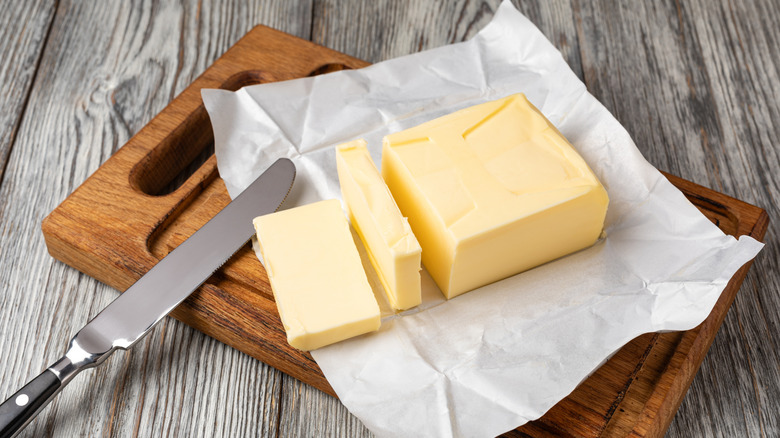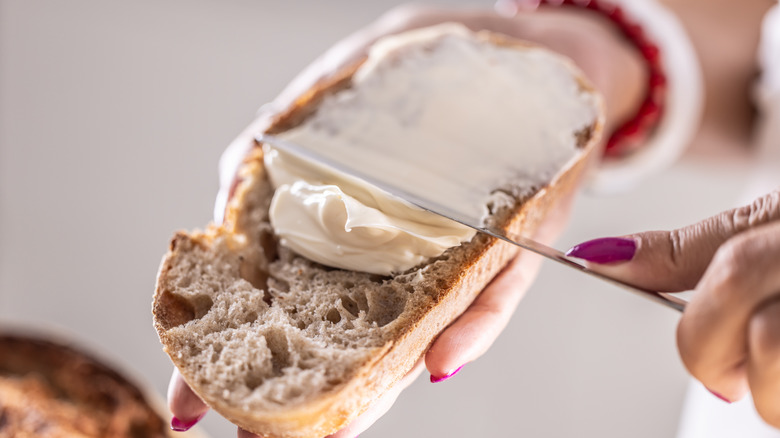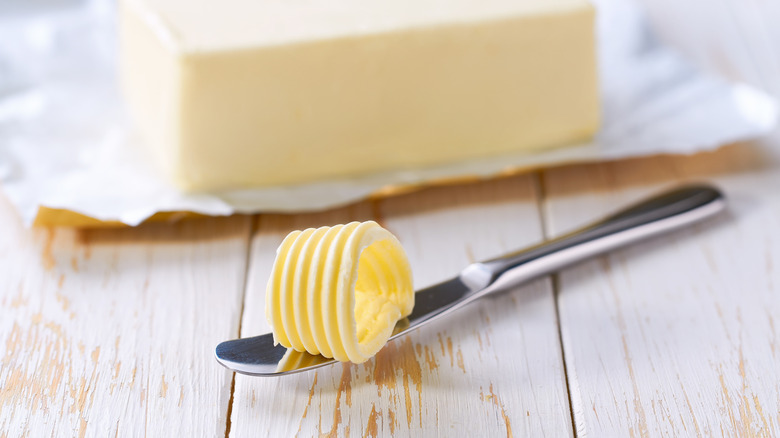Here's The Easy Way To Tell If Your Butter Has Gone Bad
There are many different kinds of butter out there, and most have a decently long shelf life. This is because the ingredient's high fat content and low water content prevent bacterial growth. But that doesn't mean it's imperishable — like any other dairy product, it will eventually expire. So, how can you tell if your butter has gone bad?
To find out, Food Republic consulted Marissa Stevens, founder and recipe developer at Pinch and Swirl. She revealed, "It's pretty easy to spot butter that's turned or has started to turn by sight and smell." These are the best metrics to use, as expired butter often comes with a terrible taste, and if consumed, it can lead to an upset stomach.
According to Stevens, "The smell test is the most reliable. Fresh butter smells clean and slightly sweet. If it starts to smell sour, metallic, or like the inside of your refrigerator, there's a good chance it's spoiled." In general, we recommend that if your butter doesn't smell right, it's best to avoid it. Another indicator of bad butter is color change. "A dark yellow outer layer with lighter yellow center means the butter has started to oxidize and will taste 'off,'" Stevens added. If your butter has oxidized, that means its fats have reacted with light, oxygen, and heat, causing rancidity that changes the butter's overall flavor and color.
How long does butter last before it goes bad?
There's no set-in-stone way to store butter. You can keep it at room temperature for a soft and spreadable texture, or you can store it in your fridge or freezer. But take care which option you choose, as salted and unsalted butters react differently.
According to Marissa Stevens,"The salt helps to preserve [butter]. Unsalted is more sensitive." This is because salt has long been used as a natural preservative, inhibiting bacterial growth by reducing moisture content. In addition to having a longer shelf life, salted butter is great for adding some extra flavor to recipes, like sautéing vegetables. In the baking department, each type shines in its own way. "In the refrigerator," Stevens revealed, "salted butter lasts about three months if it's well-wrapped." On the other hand, you should aim to use unsalted butter "within 1 month." Stevens also mentioned that both salted and unsalted butter "[last] up to a year" in the freezer. Wrap your butter well to prevent freezer burn, and remember that over time, its original flavor and texture will naturally diminish, so try to use it sooner rather than later.
At room temperature, butter's shelf life quickly diminishes due to oxidation. According to Stevens, "On the counter, salted butter is safe for about a week in a covered butter dish." She also advised that "unsalted butter shouldn't be stored at room temperature."
Should you use nearly expired butter?
If your butter is past its prime but isn't too far gone yet, is it still safe to use? According to Marissa Stevens, yes — in some cases, at least. "If the butter smells fine but the flavor is slightly off, you can sometimes get away with using it in savory dishes like grilled cheese or sautéed vegetables where it won't stand out," she told Food Republic.
If the butter isn't rancid but just lost some of its flavor through oxidation, it's not unsafe and can still work in recipes where the butter's flavor isn't a defining element. However, Stevens advised against using it in baking: "The flavor will come through in a way you can't hide." Whether or not you should use butter that's nearly off depends on where it fits into your dish's flavor profile. For example, you wouldn't want low-quality butter in your homemade butter sauces or in Stevens' butter cookie recipe. As Stevens explained, "Once it smells rancid or tastes metallic, it's time to throw it out."
She recommended that home chefs "keep butter in its original wrapper in the refrigerator, but slide it into an airtight container to keep out odors." For longer storage, "freeze it in sticks ... still wrapped, then placed in a freezer bag." If you prefer to keep this ingredient on the counter, "look for a butter bell or crock that keeps it sealed under water." These tips should extend your butter's shelf life by limiting its exposure to heat, light, and bacteria.



